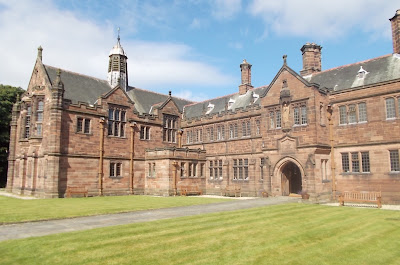What more fitting way to tackle this final task than with a few words of inspiration from Mr. Frank Sinatra?! (..and no - before anyone asks, I promise I've not been at the gin!).
 |
| Photo All About Jazz |
Taking part in CPD23 has made me more appreciative of what a truly varied and dynamic profession Librarianship is. Through the visits I've done, by connecting with some fantastically interesting and innovative library people, attending events and generally opening myself up to new perspectives, I have come to learn what values are important to me and to contemplate just what I want to achieve in my library career. I have begun to realise just how great the threat to public libraries, in particular, is and to understand that it is up to information professionals from across all sectors to speak up for libraries.
I've travelled each and every highway;
I've wandered a fair bit in the course of this blog and have now lost count of the number of libraries I visited in the past six months. Although it has been exhausting trying to keep a record of this at times (uploading photos, wrestling with Blogger's often rather erratic tendencies, yada yada..) I'm so glad I did it! I feel I will be able to look back on this journey with a fair amount of pride in years to come (and cringy-ness too! Wouldn't be the same without the cringy-ness!). I would recommend a staff exchange to anyone, if you do get the opportunity, whether through a scheme operating at your own work, through LIBEX or organised independently. It was great to meet up with some of the staff I met during my time out there in the States when they came to the UK just a couple of weeks ago. I have continued to research the things I found out while I was in the US and am now just starting to help to put some of these things into practice in my own workplace.
Regrets, I've had a few;
Promise not to rant on but the one major regret I would like to mention, looking back, has been not putting more thought into the design of this blog from the start! As a tip to anyone considering participating in this scheme next year - keep it simple!! Half of this blog has ended up in a font size which ostracises many people over the age of 40 and editing in Blogger is quite unpredictable at the best of times (have I mentioned?) so trying to mess around with different templates, layouts and things will just make matters worse! (Try Wordpress, maybe..)
I planned each chartered course,
Pretty sure CILIPquals weren't exactly what Frank Sinatra had in mind in this verse but finishing my Chartership is very much the next step along the byway for me. The same goes for many other CPD23 bloggers - TheatreGrad, It's not about books or being quiet all the time, Get Chartered! (..naturally) to name but three. I'm chuffed that I have already managed to achieve some of the goals set out in my Personal Professional Development Plan (PPDP) just through the experiences outlined in this blog, including those relating to broadening my knowledge and understanding and showing my commitment to professional develpoment. My other goals focus upon leadership skills, assertiveness and learning to evaluate service performance. I am also working my way through the Professional Knowledge Skills Base to try and identify other areas where I could improve. As an aside, I noticed an interesting quote from Liz Jolly on the latest Twitter #Chartership chat which explained a Degree/Diploma/Masters in LIS as the theoretical element of qualification, with Chartership itself as the practical part. Think that about sums it up.
To say the things he truly feels;
Hyperlinked Carliebrary posted her brilliantly earnest Future Librarian's Promise earlier this week and much of this rang true for me, for instance:
- I refuse to say "librarian” apologetically
- I promise to never be afraid to say “I don’t know.”
- If I think [my work] is moving the profession or the library in the wrong direction, I will be brave and speak up.
For those who have not seen the full Promise yet, I would more than recommend having a look - it reads like a modern-day Hippocratic Oath for Librarians and I certainly could not have put it any better!
What's my "6 word story"?
Well...I did it my way!
































